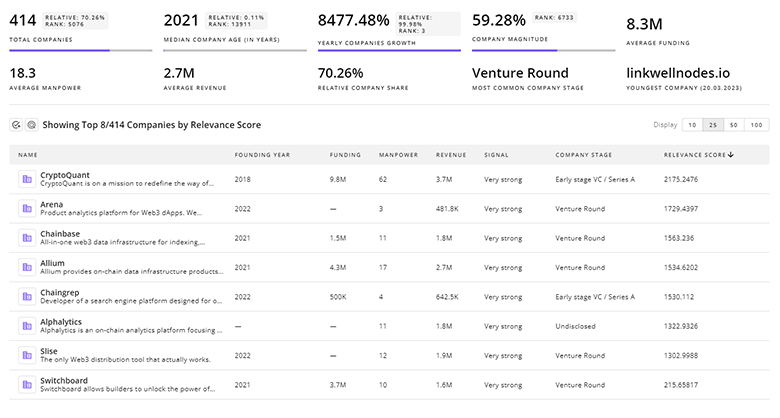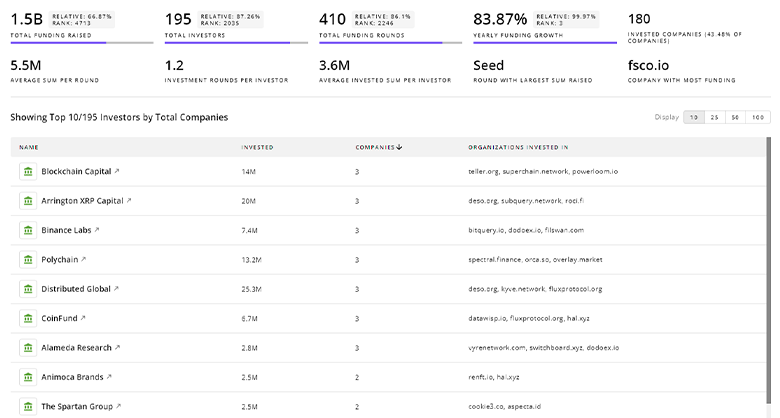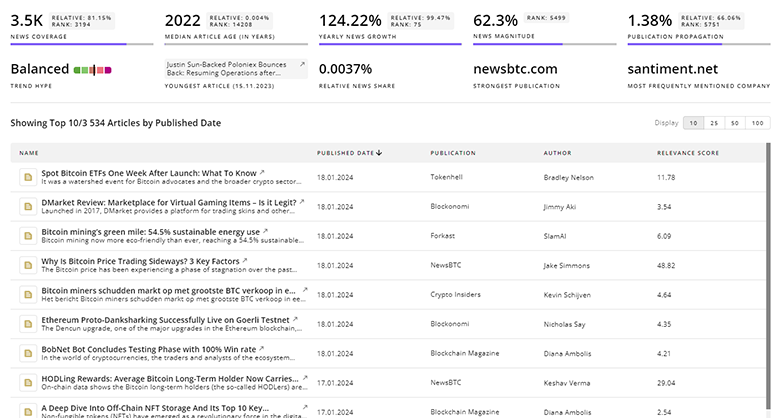
Supply Chain Sustainability Report
: Analysis on the Market, Trends, and TechnologiesThe current landscape of supply chain sustainability is marked by a growing emphasis on human rights, fair labor practices, environmental progress, and anti-corruption policies. Our supply chain sustainability report reveals that companies are integrating sustainable choices to leverage the competitive edge this brings. The data also indicates a significant surge in interest, with substantial growth in news coverage and the number of companies founded in this domain. Despite a slight decline in funding, the sector shows positive annual growth, highlighting its increasing relevance and importance. Notable investors are driving innovation, contributing to the sector’s growth, and the market overview reveals a top-ranking position in article coverage, signaling high visibility and relevance.
657 days ago, we last updated this report. Notice something that’s not right? Let’s fix it together.
Topic Dominance Index of Supply Chain Sustainability
To gauge the influence of Supply Chain Sustainability within the technological landscape, the Dominance Index analyzes trends from published articles, newly established companies, and global search activity
Key Activities and Applications
- Sustainability Assessment & Auditing: Conducting thorough assessments and audits of supply chain practices to identify areas of improvement in terms of environmental, social, and economic aspects.
- Transparency & Reporting: Maintaining high levels of transparency about supply chain practices and regularly reporting on sustainability performance to build trust and accountability.
- Carbon Footprint Measurement: Calculating the carbon footprint of supply chain operations, including transportation, production, and distribution, to understand the total greenhouse gas emissions and identify reduction opportunities.
- Sustainable Sourcing: Implementing policies and practices to prioritize raw material and product procurement from suppliers who adhere to sustainable practices, like local suppliers.
- Waste Reduction & Management: Strategies to reduce supply chain waste from production to packaging and distribution. This includes adopting practices like zero-waste production and sustainable packaging.
Emergent Trends and Core Insights
- Increased Emphasis on Scope 3 Emissions: Companies are working to measure, report, and reduce emissions due to upstream and downstream activities.
- Collaboration Across Sectors: There is an increase in multi-stakeholder initiatives where companies, governments, NGOs, and other organizations collaborate to tackle large-scale sustainability challenges.
- Consumer Demand: Customers are increasingly demanding transparency and sustainability in the products they buy, pushing companies to adopt sustainable practices throughout their supply chains.
- Regenerative Practices: Aims to restore and replenish the natural environment through supply chain activities like regenerative agriculture and restoring ecosystems.
- Adaptive Supply Chains: In response to disruptions like the COVID-19 pandemic and climate change, there is a trend towards creating more adaptive and resilient supply chains.
Technologies and Methodologies
- Blockchain: Enhances transparency and traceability within the supply chain by securely recording transactions and tracking the movement of goods.
- Artificial Intelligence (AI): AI and machine learning are used for optimizing logistics, predicting demand, and managing inventory to minimize waste and maximize efficiency.
- Sustainable Sourcing Platforms: Connects businesses with suppliers who adhere to sustainability criteria by assessing and monitoring supplier performance.
- Internet of Things (IoT): Connected devices enable real-time tracking and monitoring of assets for optimizing routes, reducing energy consumption, and monitoring conditions.
- Cloud-based Supply Chain Management: Cloud computing allows businesses to access supply chain data in real time to optimize operations and reduce their carbon footprint.
Supply Chain Sustainability Funding
A total of 505 Supply Chain Sustainability companies have received funding.
Overall, Supply Chain Sustainability companies have raised $53.1B.
Companies within the Supply Chain Sustainability domain have secured capital from 1.3K funding rounds.
The chart shows the funding trendline of Supply Chain Sustainability companies over the last 5 years
Supply Chain Sustainability Companies
Get detailed analytics and profiles on 2.5K companies driving change in Supply Chain Sustainability, enabling you to make informed strategic decisions.

2.5K Supply Chain Sustainability Companies
Discover Supply Chain Sustainability Companies, their Funding, Manpower, Revenues, Stages, and much more
Supply Chain Sustainability Investors
TrendFeedr’s Investors tool provides an extensive overview of 555 Supply Chain Sustainability investors and their activities. By analyzing funding rounds and market trends, this tool equips you with the knowledge to make strategic investment decisions in the Supply Chain Sustainability sector.

555 Supply Chain Sustainability Investors
Discover Supply Chain Sustainability Investors, Funding Rounds, Invested Amounts, and Funding Growth
Supply Chain Sustainability News
Explore the evolution and current state of Supply Chain Sustainability with TrendFeedr’s News feature. Access 4.7K Supply Chain Sustainability articles that provide comprehensive insights into market trends and technological advancements.

4.7K Supply Chain Sustainability News Articles
Discover Latest Supply Chain Sustainability Articles, News Magnitude, Publication Propagation, Yearly Growth, and Strongest Publications
Executive Summary
Supply chain sustainability is a critical and expanding field within the business community, characterized by an expansive size, average maturity, and broad industry influence. The sector demonstrates robust growth, underscored by rising interest, media coverage, and the establishment of new companies. Despite some challenges in funding, the investment climate remains strong with significant contributions from notable investors. Companies are also leveraging technologies like blockchain, AI, and IoT to enhance supply chain transparency, efficiency, and sustainability. These opportunities allow businesses to embrace sustainable practices to position themselves as leaders in a future-oriented market.
We're looking to collaborate with knowledgeable insiders to enhance our analysis of trends and tech. Join us!













